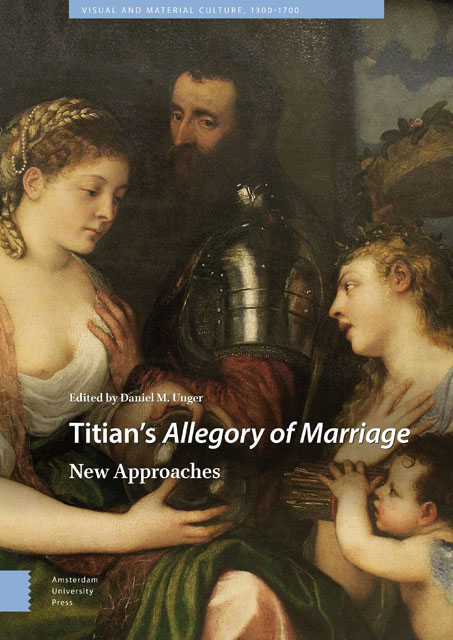Book contents
- Frontmatter
- Table of Contents
- List of Plates and Figures
- 1 Introduction: Poetic License
- 2 Love, Beauty, and the Human Body as a Reflection of the Divine
- 3 Amorosa visione: Titian’s Allegory of Marriage and the Poetry of the Half-length Format
- 4 The Arms and Armour of Titian’s Allegory of Marriage
- 5 ‘Un disio sol d’eterna gloria e fama’: A Literary Approach to Titian’s Allegory
- 6 Psyche, Venus, Ceres and Their Friends: Titian’s Remixes
- 7 Art and the Double Meaning of Reflection in Titian’s Allegory of Marriage
- 8 Titian’s Allegory of Marriage as an ‘Allegory of Peace’
- 9 Vision and Touch in the Allegory of Marriage
- 10 Of Crystal Orbs and Divinatory Mirrors : The Vicissitudes of Pregnancy and Artistic Agency in Titian’s Allegory of Marriage
- Index
2 - Love, Beauty, and the Human Body as a Reflection of the Divine
Published online by Cambridge University Press: 16 November 2022
- Frontmatter
- Table of Contents
- List of Plates and Figures
- 1 Introduction: Poetic License
- 2 Love, Beauty, and the Human Body as a Reflection of the Divine
- 3 Amorosa visione: Titian’s Allegory of Marriage and the Poetry of the Half-length Format
- 4 The Arms and Armour of Titian’s Allegory of Marriage
- 5 ‘Un disio sol d’eterna gloria e fama’: A Literary Approach to Titian’s Allegory
- 6 Psyche, Venus, Ceres and Their Friends: Titian’s Remixes
- 7 Art and the Double Meaning of Reflection in Titian’s Allegory of Marriage
- 8 Titian’s Allegory of Marriage as an ‘Allegory of Peace’
- 9 Vision and Touch in the Allegory of Marriage
- 10 Of Crystal Orbs and Divinatory Mirrors : The Vicissitudes of Pregnancy and Artistic Agency in Titian’s Allegory of Marriage
- Index
Summary
Abstract
Titian's Allegory of Marriage has a philosophical import based on the power of love and reflections of the divine and plays as well on ideas of past, present, and future. The present chapter traces the roots of these ideas to the philosophy and poetry of fifteenth-century Florence, which accorded a special place to love and beauty. According to Plato, beauty is valued for its power to engender love and to elevate the mind to the divine. Conveyed to Venice through literary texts and to Titian through the person of Pietro Bembo, these ideas can also be seen in other of Titian's works.
Keywords: Marsilio Ficino; Platonism; philosophy; love; Cristoforo Landino; Bembo
There is a dynamic tension in Titian's Allegory of Marriage between the gaze of the female subject, connecting her to a world or worlds unseen, and that of the male figure, who seems to engage with her, yet to be an unacknowledged presence. This subtle connection between the two main protagonists calls to the fore suggestions of allegory, and it is therefore not unreasonable to ask whether Neoplatonic ideas of allegory, linking the visible world with a world beyond, may be governing Titian's choice of representation. I therefore contribute to the debate on this painting by extending enquiry into the realm of ideas that were circulating at the time, looking at the intellectual and literary context in which this painting was conceived. This approach seeks to show Titian's contact with these ideas through a number of personal connections that brought ideas born in fifteenth-century Florence to a new and productive life in sixteenth-century Venice. In particular, it invokes his well-known friendship with Pietro Bembo, which may be taken as a strong pointer to the likelihood of Titian's being aware of, even if not directly engaged in, the lively intellectual debates that had been taking place during the years of his development as a painter. Since it has often been argued that Titian's skill lay entirely in the visual realm and that he was not greatly a man of words, it seeks to refine such a judgement by showing his engagement with the thoughts and words of others.
- Type
- Chapter
- Information
- Titian's Allegory of MarriageNew Approaches, pp. 27 - 48Publisher: Amsterdam University PressPrint publication year: 2022



